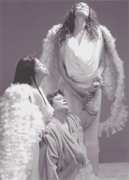Apocalypse Wow!
'Angels in America' reaches for and nearly achieves the heavens
By Sarah Phelan
THERE'S NOTHING lightweight about Tony Kushner's Angels in America. Let's just call it the Muhammad Ali of hard-hitting drama. Vastly entertaining, and heavily apocalyptic, this powerful vision of America at the turn of the millennium "floats like a butterfly, stings like a bee" for two exhilarating rounds that'll leave you gratefully exhausted after a whopping seven hours of ring time.
"Seven hours?" My companion spat out the words in a less than enthusiastic tone, when I broke the devastating news on opening night just as the curtain rose. Don't worry--the play comes in two parts, and can be viewed sequentially on separate days, or back-to-back marathon-style.
In our case, by the time Part 1: Millennium Approaches reached its climactic close, both of us were bowled over by the breadth and depth of Kushner's brilliantly scathing script, and eager to see Part 2: Perestroika the following night. But we questioned whether Kushner would maintain the clarity of his dreamlike tapestry or end up getting his playwright's knickers in a twist by trying to pull any tighter on all those already intricately interwoven story threads.
We needn't have worried: Part 2 is just as absurd and intense as Part 1 in an equally magical, moving and side-splitting kind of a way. Nobody is spared Kushner's rapier wit, yet almost everybody has some saving grace. And under Wilma Marcus-Chandler's able direction, all seven hours flash by like mere nanoseconds in the vast continuum of time.
So what's the play about? Subtly subtitled A Gay Fantasia on National Themes, the starting point of Angels in America is 1985, the year that AIDS became an equal-opportunity epidemic. Against a broad canvas of everything from global warming and the death of God to Reaganomics and the bubonic plague, the AIDS virus becomes a metaphor for devastation, migration and survival on a universal level.
Part 1: Millennium Approaches opens in New York at a memorial service for one of the last of the "European Mohicans," a Jewish grandmother who made the arduous and perilous crossing from the Old to the New World. Now, as she undertakes this, her final crossing, a rabbi reminds us that we are making equally life-threatening journeys, though not necessarily physical ones, in each day of our stress-filled lives. This scene sets us up for the parallel unraveling and ensuing devastation of two very different couples. On the left, our reluctant hero, Prior, shows his gay lover, Louis, his "kisses from the angel of death"--wine-colored lesions that herald his eventual demise and stigmatize him as HIV positive.
And on the right--the very Republican Right--we see Joe and Harper Pitt, a young Mormon couple, who've migrated from Salt Lake City to New York to further Joe's career as a promising lawyer with the Justice Department. But far from seeing justice done, Joe unwittingly lets the vitriolic Roy Cohn penetrate his spiritual sphincter, while the mentally disturbed and sex-starved Harper hides in their apartment listening to reports of ecological disaster and escaping into Valium-induced fantasies. Entering a gray zone where reality and illusion blend, she crosses the threshold of revelations and realizes that if nothing is real, then anything is possible--including the possibility that her husband is gay.
While the play paints a painfully candid picture of AIDS and its impact on the homosexual community, it clearly makes the point that gays aren't the only ones falling apart--so is the planet in general. There are gaping holes in both the ozone and the condom up Louis' butt, poison in our rivers and in our blood, and both the icecaps and history are about to crack wide open.
Don't miss this opportunity to learn why card playing is popular in heaven, listen to an ethereal original score from Michael McGushin, and watch Central Coast Theatre Works dance surefootedly through this knockout epic with stellar performances from Mark Messersmith as Roy Cohn, Matthew Howard as Prior Walter, Sam Lovett as Joe Pitt, Daria Maudlin as Harper Pitt, Lawrence Thompson as Belize, and Hope Nicora as the Angel.
This page was designed and created by the Boulevards team.

Jana Marcus
Angels in America runs through July 27 at the Louden Nelson Community Center, 301 Center St., SC. Part One shows at 7pm Fridays and 2pm Saturdays. Part Two shows at 7pm Saturdays and 2pm Sundays. Tickets cost $20 per part/$36 for both. For more info, call 429-7461.
From the July 3-10, 1996 issue of Metro Santa Cruz
Copyright © 1996 Metro Publishing and Virtual Valley, Inc.
